#i also appreciate that jessie mei li plays alina so much more likable than she was in the books
Text
i love watching shadow and bone bc i never know whats going on and the plot never makes any sense but ben barnes and jessie mei li are the prettiest people ive ever seen
#i also appreciate that jessie mei li plays alina so much more likable than she was in the books#shadow and bone#grishaverse
35 notes
·
View notes
Text
The Crows Summon the Sun
Or, Hamliet’s review of Shadow & Bone, which gets a 4.5/5 for enjoyment and a 3.5/5 in terms of writing.
The true heroes of this story and the saviors of the show are the Crows. However, the problem is that the show then has an uneven feel, because the strength of the Crows plotline highlights the weaknesses of the trilogy storyline. But imo, overall, the strengths overshadow (#punintended) the weaknesses.
I’ll divide the review into the narrative and the technical (show stuff, social commentary), starting with narrative.
Narrative: The Good
It’s What The Crows Deserve
I went into the show watching it for the Crows; however, knowing that their storyline was intended to be a prequel, I wasn’t terribly optimistic. And while it is a prequel, the characters have complete and full arcs that perfectly set them up for the further development they will have in the books (which I think should be the next season?). Instead of retreading the arcs they’d have in the books, which is how prequels usually go, they had perfect set up for these arcs. It’s really excellent.
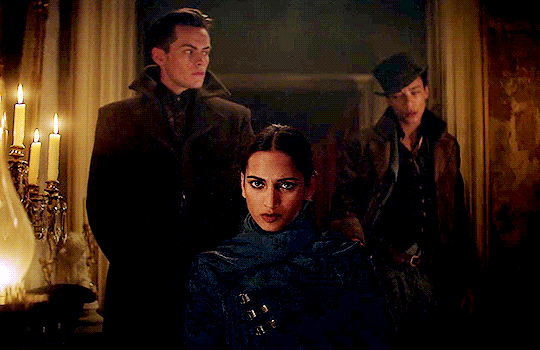
Jesper, Inej, and Kaz are all allowed to be flawed, to have serious conflicts with one another, and yet to love each other. They feel like a found family in the best of ways. Kaz is the perfect selfish rogue; he’s a much more successfully executed Byronic hero than the Darkling, actually. Inej is heroic and her faith is not mocked, yet she too is flawed and her choices are not always entirely justified, but instead left to the audience to ponder (like killing the girl), which is a more mature writing choice that I appreciated.
Jesper is charming, has a heart of gold despite being a murderer and on the surface fairly greedy, and MILO THE EMOTIONAL SUPPORT GOAT WAS THE BEST THING EVER. I also liked Jesper’s fling with Dima but I felt it could be better used rather than merely establishing his sexuality, like if Jesper and Dima had seen each other one more time or something had come of their tryst for the plot/themes/development of Jesper.
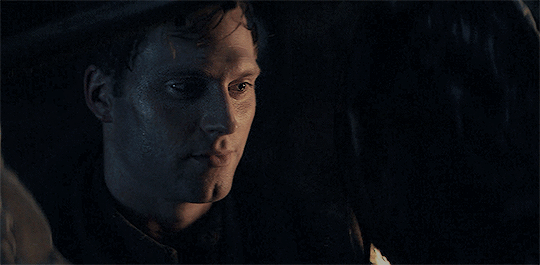
Nina and Matthias’s backstory being in the first season, instead of in flashbacks, really works because it automatically erases any discomfort of the implications of Nina having falsely accused Matthias that the books start with. We know Nina, we know Matthias, we know their motivations, backgrounds, and why they feel the way we do. It’ll be easy for the audience to root for them without a lot of unnecessary hate springing from misunderstanding Nina (since she’s my favorite). Matthias’s arc was also really strongly executed and satisfyingly tragic. Their plotline was a bit unfortunately disconnected from the rest of the story, but Danielle Gallagan and Callahan Skogman have absolutely sizzling chemistry so I found myself looking forward to their scenes instead of feeling distracted. Also? It’s nice seeing a woman with Nina’s body type as a romantic and powerful character.
Hamliet Likes Malina Now
Insofar as the trilogy storyline goes, the best change the show made was Mal. He still is the same character from the books, but much more likable. The pining was... a lot (too much in episode 4, I felt) but Malina is a ship I actually enjoyed in the show while I NOTP’d it in the books. Mal has complexity and layers to his motivations (somewhat) and a likable if awkward charm. Archie Renaux was fantastic.
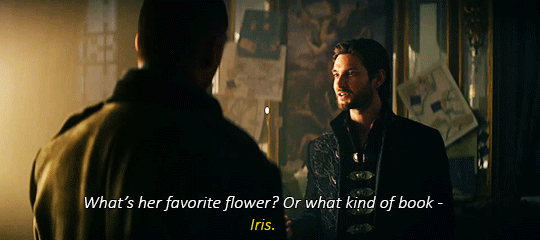
Ben Barnes is the perfect Aleksandr Kirigan, and 15 year old me, who had the biggest of big crushes on Ben Barnes (first celebrity crush over a decade ago lol), was pretty damn happy lol. He’s magnificantly acted--sympathetic and terrifying, sincerely caring and yet villainous in moments. Story-wise, I think it was smart to reveal his name earlier on than in the books, because it helps with the humanization especially in a visual medium like film. Luda was a fitting (if heartbreaking) backstory, but it is also hard for me to stomach knowing what the endgame of his character is. Like... I get the X-men fallacy thing, but I hope the show gives more kindness to his character than the books did, yet I’m afraid to hold my breath. Just saying that if you employ save the cat, if you directly say you added this part (Luda) to make the character more likable (as the director did) please do not punish the audience for feeling what you intended.
I also liked the change that made Alina half-Shu. It adds well to her arc and fits with her character, actually giving her motivations (she kinda just wants to be ordinary in a lot of ways) a much more interesting foundation than in the books. Also it’s nice not to have another knock-off Daenerys (looking to you Celaena and book!Alina). Jessie Mei Li does a good job playing Alina’s insecurities and emotions, but...
Narrative: The Ehhhhhhh
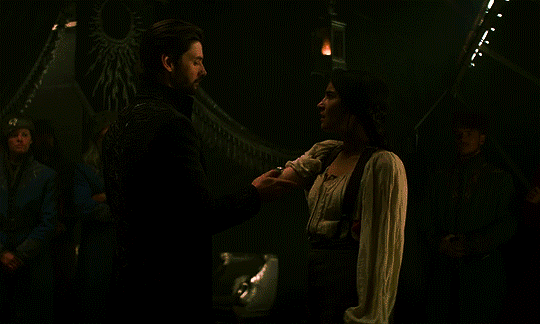
Alina the Lamp
Sigh. Here we go. Alina has little consistent characterization. She’s almost always passive when we see her, yet she apparently punches an officer for calling her a name and this seems to be normal for her, but it doesn’t fit at all with what we know about her thus far. Contradictions are a part of humanity, but it’s never given any focus, so it comes across as inconsistent instead of a flaw or repression.
I have no idea what Alina wants, beside that she wants to be with Mal, which is fine except I have no idea what the basis of their bond is. Even with like, other childhood friends to lovers like Ren/Nora in RWBY or Eren/Mikasa in SnK, there’s an inciting moment, a reason, that we learn very early on in their story to show us what draws them together. Alina and Mal just don’t have that. There’s the meadow/running away thing, but they were already so close, and why? Why, exactly? What brought them together? The term “bullies” is thrown around but it isn’t ever explored and it needed to be this season. If I have to deal with intense pining for so many episodes at least give me a foundation for their devotion. You need to put this in the beginning, in the first season. You just do.
A “lamp” character is a common metaphor to describe a bad character: essentially, you could replace the character with a lamp and nothing changes. Considering Alina’s gift is light, it’s a funnily apt metaphor, but it really does apply. Her choices just don’t... matter. She could be a special lamp everyone is fighting over and almost nothing would change. The ironic thing is that everyone treating her like a fancy lamp is exactly the conflict, but it’s never delved into. We’re never shown that Alina is more than a lamp. She never has to struggle because her choices are made for her and information is gifted to her when she needs it. Not making choices protects Alina from consequences and the story gives her little incentive to change that; in fact, things tend to turn out better when she doesn’t make choices (magic stags will arrive).
Like... let’s look at a few occasions when Alina almost or does make choices. For example, she chooses to (it seems) sleep with Kirigan, but then there’s a convenient knock at the door and Bhagra arrives with key information that changes Alina’s mind instantly despite the fact that Bhagra’s been pretty terrible to her. If you want to write a woman realizing she’s been duped by a cruel man, show her discovering it instead of having the man’s abusive mother tell her when she had absolutely no such suspicions beforehand. There’s no emotional weight there because Alina doesn’t struggle.
When she is actually allowed to carry out a bad choice, the consequences are handwaved away instead of built into a challenge for her. Like... Alina got her friends killed. More than once. I’m not saying she’s entirely to blame for these but could we show her reacting to it? Feeling any sort of grief? She never mentions Raisa or Alexei after they’re gone, just Mal, and I’m... okay. They were there because of you. Aren’t you feeling anything? Aren’t you sad? The only time Alina brings up her friends’ deaths is to tell Kirigan he killed her friends when they were only there because she burned the maps. She yells at Kirigan for “never” giving her a choice, but she almost never makes any, so why would he? Alina has the gall to lecture Genya about choices, but she herself almost never has to make any.
Which brings me to another complaint in general: Alina’s lack of care for everyone around her when they’re not Mal, even if they care for her. Marie dies because of her (absolutely not her fault of course) but as far as we know she never even learns about Marie. She certainly doesn’t ever ask about her or Nadia. Alina seems apathetic at best to people, certainly not compassionate or kind.
The frustrating thing is that there is potential here. Like, it actually makes a lot of psychological sense for an orphan who has grown up losing to be reluctant to care for people outside of her orbit and that she would struggle to believe she can have any say in her destiny (ie make choices). It’s also interesting that a girl who feels like an outsider views others outside her. But the show never offers examines Alina’s psychology with any depth; it simply tells us she’s compassionate when she is demonstrably not, it tells us she makes decisions when it takes magical intervention to do so. It’s a missed opportunity. This does not change between episodes 1 and 8, despite the episodes’ parallel structures and scenes, which unintentionally reinforces that Alina had little real development.
Inej and ironically Jesper and Kaz embody the concept of “mercy” far better and with far more complexity than Alina does. The Crows have reactions to the loss of people who even betray them (Arken, etc), learn, and course-correct (or don’t) when they are even loosely involved in having strangers die. They’re good characters because they change and learn and have their choices matter. When they kill we see them wrestle with it and what this means even if they are accustomed to doing so. Jesper can’t kill in front of a child. Kaz wonders what his killings do to Inej’s idea of him.
Narrative: The Mixed Bag
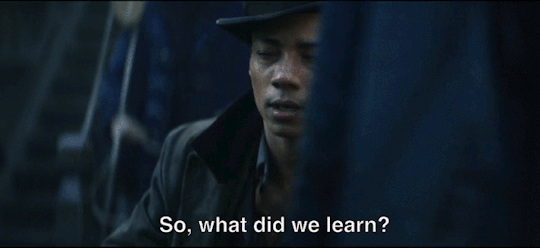
Tropes, Themes, Telling vs. Showing
So the show’s themes in the Alina storyline are a mess, as they are in the trilogy too. Tropes are a very valuable way to show your audience what you’re trying to say. They’re utilized worldwide because they resonate with people and we know what to expect from them. The Crows' storyline shows us what it wants us to learn.
Preaching tells, and unfortunately, the trilogy relies on telling/preaching against fornicationBad Boys. It’s your right to write any trope or trample any trope you want--your story--but you should at least understand what/why you are doing so. The author clearly knows enough about Jungian shadows and dark/light yin/yang symbolism to use it in the story, but then just handwaves it away as “I don’t like this” but never does so in a narratively effective way: addressing the appeal in the first place. If you really wanna deconstruct a trope, you gotta empathize with the core of the reason these tropes appeal to people (it allays deep fears that we are ourselves unlovable, through loving another person despite how beastly they can be), and address this instead of ignoring it. Show us a better way through the Fold of your story. Don’t just go around it and ignore the issue.
The trilogy offers highly simplistic themes at best--bad boy bad and good boy good, which is fine-ish for kid lit but less fine for adult complexity, which the show (more so than the books) seems to try to push despite not actually having much of it.
Alina and Mal are intended to be good, we’re told they are, but I’m not sure why beyond just that we’re told so. Alina claims the stag chose her, but in the show it’s never explained why at all. Unlike with Kaz, Inej, Jesper, and hell even Matthias and Nina, we don’t see Alina or Mal’s complex choices and internal wrestling.
Like, Inej’s half-episode where she almost killed the guy they needed was far more character exploration than Alina has the entire show, to say nothing of Inej’s later killing which not only makes her leaps and bounds more interesting, but ironically cements her as a far more compelling and yes, likable, heroine than Alina. We see Inej’s emotional and moral conflict. We can relate to her. We see Kaz struggling with his selfishness and regrets, with his understanding of himself through his interactions with and observations of Inej, Alina, the Darkling, Arken, and Jesper.
We don’t explore what makes Mal or Alina good and what makes them bad. We don’t know what Alina discovers about herself, what her power means for her. We are told they are good, we are told she knows her power is hers, but never shown what this means or what this costs them/her. Their opportunities to be good are handed to them (the stag, Bhagra) instead of given to them as a challenge in which they risk things, in which doing good or making a merciful choice costs them. Alina gets to preach about choices without ever making any; Inej risks going back to the Menagerie to trust Kaz. Her choices risk. They cost. They matter and direct her storyline and her arc, and those of the people around her.
Production Stuff:
The Good:
The production overall is quite excellent. The costumes, pacing, acting, and cinematography (for example, one of the earliest scenes between the Darkling and Alina has Alina with her back to the light, face covered in his shadow, while the Darkling’s face is light up by her light even if he stands in the shadows) are top-notch. The soundtrack as well is incredible and emphasizes the scenes playing. The actors have great chemistry together, friend chemistry and romantic when necessary (Mal and Alina, the Darkling and Alina, Kaz and Inej, Nina and Matthias, David and Genya, etc.) All are perfectly cast.
The Uncomfortable Technicalities Hamliet Wants to Bitch About:
The only characters from fantasy!Europe having any trace of an accent reminiscent of said fantasy country's real-world equivalent are antagonists like Druskelle (Scandinavia) and Pekka (Ireland). When the heroes mostly have British accents despite being from fantasy Russia and Holland, it is certainly A Choice to have the Irish accent emphasized. The actor is British by the way, so I presume he purposely put on an Irish accent. I'm sure no one even considered the potential implications of this but it is A Look nonetheless.
The Anachronisms Hamliet Has a Pet Peeve About:
The worldbuilding is compelling, but the only blight on the worldbuilding within the story itself (ignoring context) was that there are some anachronisms that took me out of the story, particularly in the first episode where “would you like to share with the class” and “saved by the horn” are both used. Both are modern-day idioms in English that just don’t fit, especially the latter. The last episode uses “the friends we made along the way.” There are other modern idioms as well.
IT’S STARKOVA and Other Pet Peeves Around the Russian Portrayal
Russian names are not hard, and Russian naming systems are very, very easy to learn. I could have waved “Starkov” not being “Starkova,” “Nazyalensky” not being “Nazyalenskaya,” and “Safin” not being “Safina” as an American interpretation (since in America, the names do not femininize). However, “Mozorova” as a man is unfathomable and suggests to me the author just doesn’t understand how names work, which is a bit... uh okay considering a simple google search gets you to understand Russian names. They aren’t hard. I cannot understand why the show did not fix this. It is so simple to fix and would be a major way to help the story’s overall... caricature of Russia.
Speaking of that... Ravka is supposedly Russian-based, but it is more accurately based on the stereotypes of what Americans think of Russia. Amerussia? Russica? Not great.
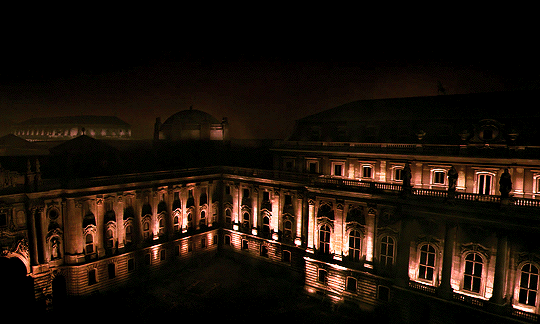
The royals are exactly what Americans think of the Romanovs, right down to the “greasy” “spiritual advisor” who is clearly Rasputin and which ignores the Romanov history, very real tragedy, and the reason Rasputin was present in the court. The religion with all its saints is a vapid reflection of Russian Orthodoxy. The military portrayal with its lotteries and brutality and war is how the US views the Russian military. The emphasis on orphans, constant starvation, classification, and children being ripped from their homes to serve the government is a classic US understanding of USSR communism right down to the USSR having weapons of destruction the rest of the world fears (Grisha). Not trying to defend the Soviet Union here at all, but it is simplistic and reductive and probably done unconsciously but still ehhhh.
However, I’m not Russian. I just studied Russian literature. I’ve seen very little by way of discussion of this topic online, but what I do see from Russian people has been mixed--some mind, some don’t. The reality is that I actually don’t really mind this because it’s fantasy, though I see why some do. I'm not like CANCEL THIS. So why am I talking about this beyond just having a pet peeve?
Well, because it is a valid critique, and because it doesn’t occur in a vacuum. The Grishaverse is heralded as an almost paragon for woke Young Adult literature, which underlines itself what so frustrates me about how literary circles discuss issues of diversity and culture. Such praise, while ignoring its quasi-caricature of Russia, reflects a very ethnocentric (specifically American) understanding of culture, appropriation, and representation. All stories are products of their culture to various extents, but it bothers me on principle what the lit community reacts (and overreacts sometimes?) to and what people give a pass to. The answer to what the community reacts to and what it gives a pass always pivots on how palatable the appropriation is to American understandings and sensibilities. There’s nuance here as well, though.
I'm not cancelling the story or thinking it should be harshly attacked for this, but it is something that can be discussed and imo should be far more often--but with the nuance it begs, instead of black/white. But that’s a tall ask.
#s&b#hamliet reviews#shadow and bone#six of crows#kanej#jesper fahey#kaz brekker#inej ghafa#alina starkov#malyen oretsev#the darkling#darklina#malina#aleksander kirigan#netflix shadow and bone#s&b review
276 notes
·
View notes